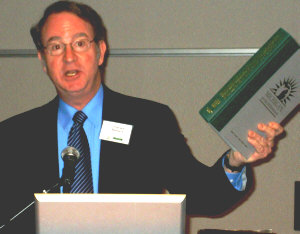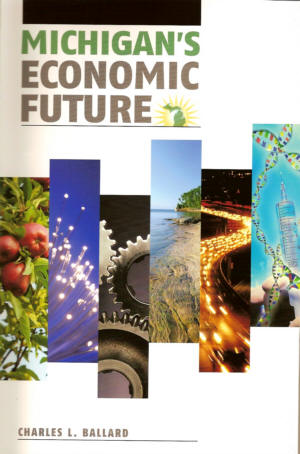Michigan's Economic Future Not An Oxymoron, Says MSU Prof-Author Ballard
|
||||||||||
| Printer Friendly Story View |

Prof. Charles Ballard holds aloft a copy of Michigan at the Millennium, Analysis of Fiscal and Economic Structure, a book he co-edited, during a speech to the Tri-County Economics Club.

New book, "Michigan's Economic Future," is selling like proverbial hotcakes, especially after Ballard's appearance on the News Hour with Jim Lehrer.
Remember the 1950s when Flint was one of the most affluent cities in the country?
Cars all had tail fins.
Young people didn't have to complete high school to get good paying jobs.
Everybody had two cars and a place up north.
Well, those days aren't coming back "but this is not Bangladesh or Bolivia" says Charles L. Ballard, economics professor at Michigan State University who has written "Michigan's Economic Future," published by the MSU Press.
"Listening to the national media you'd think we lived in grass huts," he commented. "But we are not poor, the resources are there."
"A single-minded focus on cutting taxes and government services will not take Michigan where it needs to go," he says on the book jacket. "The level of taxation in Michigan is far lower than it once was, and Michigan's archaic tax system is increasingly unable to provide enough resources to make necessary investments for the future."
The answer to Michigan's economy, says Ballard, is "better attitudes and better politics," calling for an end to the "bitter partisanship in Lansing." Also, education and skill development, innovation and entrepreneurship through a culture of lifelong learning are vital.
He said Ann Arbor's economy is the "poster child" for what Michigan can be.
A graduated income tax, like that used in 37 other states and the federal government, would help achieve stable revenues and adequate K-16 education funding. He also called for an end to business taxes and legislative gerrymandering.
"Businesses can't pay taxes," he said, "only people pay business taxes."
State and local taxes in Michigan as a percent of national income are about the national average, 11 percent, while in New York that figure is 15 percent, he said. "There has been a lot of overemphasis on taxes," he commented.
The best news for Michigan is the recent landmark agreements between the United Auto Workers Union and the Big Three automakers, said Ballard. "This gets us closer to the point where these companies can be stabilized and take advantage of growth in other sectors of the economy," he said.
Education and health care services are rising and there are growth opportunities in information technology, biotech and energy as well as leisure and hospitality fields, said Mr. Ballard.
Michigan is a victim of its own success in the 1940s, 1950s and 1960s, said Ballard. There is still a longterm upward trend to the state's economy even though it has been flat in this century, he added.
"The depression of the early 1980s was the first real warning sign that things were going to be difficult," said Ballard. We have lost about 1 percent relative to the national averages every three years, he noted.
This trend can continue or bottom out and turn around depending on what Michiganians do. If it doesn't turn around we will be where Arkansas and Mississippi are right now economically, said Prof. Ballard.
The loss of manufacturing jobs is not isolated in Michigan, he said, noting that nationally the percentage of employment in that sector has dropped from 20 percent to 12 percent since 1963. In Michigan the fall has been from 48 percent to 18 percent.
He refuted columnist George Will's recent assertion that "Michigan has taxed itself into a one state recession." When John Engler, celebrated as a tax cutter and welfare reformer, took office the unemployment rate in Michigan was 3.1 percent; when Engler's terms were done the rate was 6.7 percent, according to Ballard.
Ballard recommends a bipartisan panel of retired judges to conduct legislative redistricting and a way to moderate the "winner take all" election through a system of proportional representation.###
| Printer Friendly Story View |
|
|

Dave Rogers |
|
|
|
Printer-Friendly Story View
0200 Nd: 04-15-2024 d 4 cpr 0
12/31/2020 P3v3-0200-Ad.cfm
SPONSORED LINKS
12/31/2020 drop ads P3v3-0200-Ad.cfm


